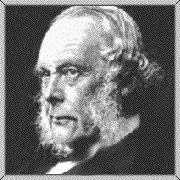 Joseph
Lister has contributed much to our understanding of
the causes of disease. He was born in 1827 in Upton, England. He
attended London and Edinburgh Universities. He accepted a position at
the Glasgow Royal Infirmary after graduation.
Joseph
Lister has contributed much to our understanding of
the causes of disease. He was born in 1827 in Upton, England. He
attended London and Edinburgh Universities. He accepted a position at
the Glasgow Royal Infirmary after graduation.
At the beginning of his career he studied the coagulation of blood in injuries and surgical wounds. He noted that there was a very high incidence of infection in wounds, in spite of efforts to keep rooms clean. In his efforts to reduce bacteria, he began to spray carbolic acid on surgical instruments, on wounds, and surgical dressings. He reduced surgical mortality to 15% by the year 1860.
His work with antiseptics met with initial resistance in the medical community but were soon widely accepted.
He was made a baron by Queen Victoria in 1897. Lister died in England in 1912.
References
Asimov, I. (1964). Asimov's Biographical Encyclopedia of Science and Technology: The Living Stores of More than 1000 Great Scientists from the Age of Greece to the Space Age Chronologically Arranged. Garden City, NJ: Doubleday.
Daintith, J. Mitchell, S., Tootill, E. (1981). A Biographical Encyclopedia of Scientists. New York: Facts on File.
Debus, A.G. (1968). World Who's Who in Science: A Biographical Dictionary of Notable Scientists from Antiquity to the Present. Chicago: Marquis.
Howard, A.V. (1951). Chamber's Dictionary of Scientists. London: Chambers.
McGraw-Hill (1966). McGraw-Hill Modern Men of Science. New York: McGraw Hill.
Taton, R. (Ed.) (1963). History of Science: Ancient and Medieval Science from the Beginnings to 1450. New York: Basic Books.